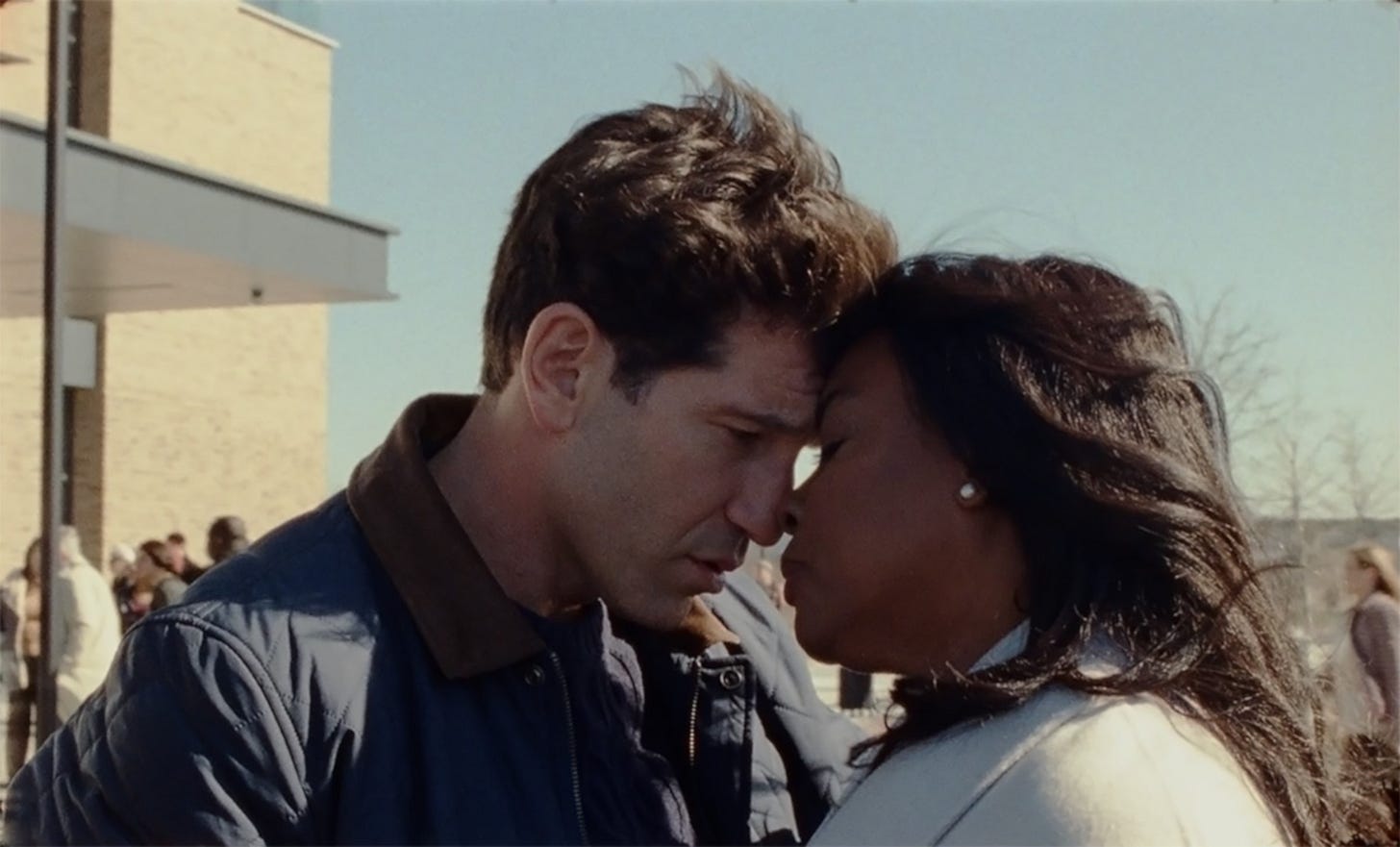Origin
Ava DuVernay's oversimplification of a problem does it no justice.
What if racism isn’t to blame for society’s ills? This is the question asked by Origin, Ava DuVernay’s adaptation of the book Caste by Isabel Wilkerson. In the book, Wilkerson uses the notion of caste—socially constructed in- and out-groups that determine who has power and who is rendered powerless—to connect atrocities such as chattel slavery in the United States, the murder of Jews in the Holocaust, and the treatment of Dalit people in India. Racist attitudes reinforce caste, argues Wilkerson, and therefore racism is a symptom of societal sickness, not the source.
This is heavy theoretical lifting paired with serious subject matter: difficult material to translate from print to screen. Rather than adapt Wilkerson’s work as a straightforward documentary, DuVernay opts to dramatize the story of how Wilkerson (played by Aunjanue Ellis-Taylor) wrote the book, weaving together the research she conducted and the personal tragedies she experienced while writing. Sometimes the research insists upon itself, seeping into Wilkerson’s conversations with her friends and family; sometimes personal tragedy imposes itself on her life, and she’s left to pick up the pieces after grieving her loss. Sequences of research and real life alternate with each other as Wilkerson negotiates who she is after her losses while also sorting through the argument she wants to shape. The result is a shaggy journalism movie that culminates not with an explosive front-page exposé but with the completion of Wilkerson’s book.
DuVernay treats the story as a journey of self-discovery paired with Wilkerson’s discoveries of historical documents that support her thesis. The film braids together Wilkerson’s personal journey with historical reenactments of the events mentioned in the book. When Wilkerson goes to a library in Berlin, we recognize it because it has already appeared in a flashback to Germany during Hitler’s rise to power. This technique supports Wilkerson’s thesis that disparate forms of oppression are interconnected (the Nazis modeled their treatment of Jewish people on the Jim Crow laws of the United States, for example), but such connections are relatively few, as though DuVernay preferred to simplify the main pillars of the book rather than expand on them.
It’s difficult to make a movie about academic research accessible, let alone interesting. DuVernay opts for the accessible often at the expense of the interesting. In at least one montage sequence set to music, Wilkerson meets a colleague to discuss her theory, but we hear nothing of the conversation. We’re left on the outside looking in. Another scene more effectively captures the frustration of having a theory but being unable to express it because it hasn’t yet been fully explored. Wilkerson tries explaining her idea to her publisher, Kate (Vera Farmiga), and the words come out in a rush. The audience can track the line of thought because the film remains firmly planted in Wilkerson’s point of view, but Kate can only express confusion. She tells Wilkerson that she doesn’t understand the idea and that it will make a great book once it’s been put into words.
Origin remains trapped within words, unable to fully commit to its visuals without underlining each image with at least one sentence explaining why it’s important. Eventually, the film resorts to expressing itself, quite literally, with sentences written on a whiteboard. The images that accompany the research are striking, but the argument is simplistic enough to feel watered down while the whiteboard visual aid feels patronizing. At a family reunion, Wilkerson’s cousin Marion (Niecy Nash) asks her to explain the topic of her book in plain English, implying that the precision of Wilkerson’s language is so lofty that it will soar over the heads of ordinary, non-academic readers. DuVernay’s interpretation of the book takes Marion’s advice to an extreme by keeping the story so simple that there’s no room for complexity.
Early in the film, Wilkerson complains that racism is blamed for every injustice in the United States. Wilkerson herself is Black. She does not pretend that racism doesn’t exist; she has a nuanced approach to the issue that’s at odds with Instagram-style infographics. Her critique of the widespread use of the term is that it flattens the real issue at hand, equating the murder of Trayvon Martin with suspicious looks from White people in a department store. Both injustices are wrong, but Wilkerson won’t accept an easy, simplistic explanation for either of them. Unfortunately, DuVernay’s film presents Wilkerson’s argument in such a way that it begins to resemble the viewpoint against which she chafes at the beginning of the film.
I wanted to be on board with Origin. Instead, I felt like Wilkerson’s publisher Kate: a little lost, disappointed that I hadn’t been given more detail, and interested in reading the book. I was left with a sense of irritation that the boldness of Wilkerson’s claims had been blunted, then backed up by a sledgehammer. —Sarah Welch-Larson
★☆☆☆
Origin is in theaters now.



